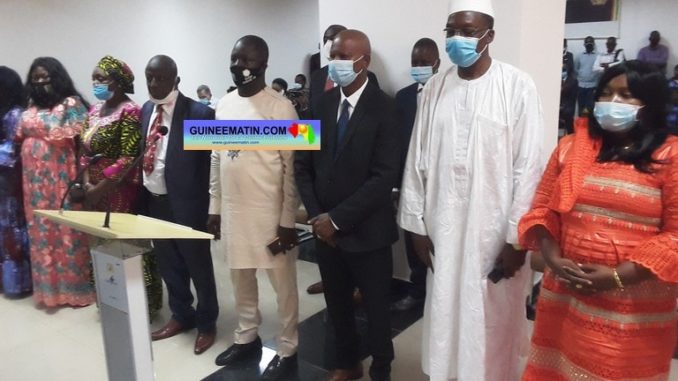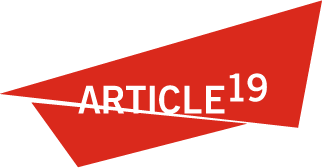
Two weeks ahead of the presidential election, ARTICLE 19 warns that the government of Guinea by appointing a President of the media regulatory authority ‘Haute Autorité de Communication (HAC)’ has taken steps that undermine the independence of the media.
The new Parliament of Guinea, chosen in March 2020 and boycotted by the main opposition parties, adopted the controversial law that undermines the independence of the media regulatory body, Haute Autorité de Communication (HAC) by providing to the President of the Republic the power to intervene in its governance.
Fatou Jagne Senghore, Regional Director of ARTICLE 19 West Africa, denounced the involvement of the executive power in the appointment of the chairman of the HAC:
“The meddling of public power in the governance of the HAC is unacceptable. It is likely to influence the decisions of the regulatory body on the media. This law is a severe setback in media regulation.
The government must repeal these provisions immediately to ensure the HAC maintains its independence from political authorities as is required under international human rights standards.”
On 25 August, the President of the Republic appointed by decree Boubacar Yacine Diallo as President of the HAC. This appointment comes following the adoption of a new law on the composition, organization and running of the High Authority for Communication (HAC) by the Parliament in July 2020.
The main changes in the law include:
- The President of the Republic will appoint the head of the regulatory body, which was previously done by its peers.
- The composition of the HAC has grown from 11 to 13. Three of them are to be appointed by the Head of State, while the previous law provided for the Head of State to select one member. Media corporations delegate five others, and the remaining five are appointed by the President of the National Assembly, the National Federation of Filmmakers of Guinea (FENACIG), the Ministry of Posts, Telecommunications and the Digital Economy, the Supreme Judicial Council and printers.
- The issuance of approvals for the creation of audiovisual media in Guinea no longer falls within the remit of the HAC but is the responsibility of the Ministry of Information and Communication.
The interference of the executive power is likely to influence the decisions of this regulatory body on the media. International standards require that it is independent of the government and ensures freedom and protection of the press.
“The authorities must not adopt such disputable laws to control the media and indirectly restrict the right of access to information and violate citizen participation. The HAC must play its full role without being influenced by the President. It must be independent, impartial and autonomous in the mission assigned to it.
“For the sake of ensuring the respect of this independence, regulatory bodies must be able to make decisions free from political influence and operate independently. The authorities must refrain from interfering with independent authority,” reminded Fatou Jagne Senghore
The new law on the HAC is a real step backwards for free speech and access to information in the country and violates international human rights standards Guinea committed to.
The Declaration of Principles on Freedom of Expression and Access to information in Africa requires that governments protect regulatory bodies from any interference, particularly of a political or commercial nature. The procedure for appointing members should be open, transparent and allow for public participation and consultation.
In a joint statement, the four Special Rapporteurs on Freedom of Opinion and Expression of the United Nations, the Organization of American States (OAS), the African Commission on Human and Peoples’ Rights (ACHPR), the Representative of the Organization for Security and Cooperation in Europe (OSCE) supported by ARTICLE 19, called on States to ensure that media regulatory bodies are independent, operate transparently, are accountable to the public, respect the principle of limited scope of regulation and provide appropriate oversight of private actors.
During the 2015 Universal Periodic Review, Guinea accepted the recommendation to guarantee media independence and the safety of journalists during elections. But ahead of the 2020 review in its national report in January 2020, Guinea has not shown any progress in implementing this recommendation. Instead of taking this electoral year as an opportunity to implement the said recommendation, Guinea has only increased the political meddling in the Media Regulation Authority.
Concerns of media
The media in Guinea are worried about the impact of the law as well as the appointment of the chairman and the other new members by the President of the Republic.
The Director of Publication of the information website Africaguinee, Diallo Boubacar, expressed his concerns to ARTICLE 19:
“The adoption of this law was done in the absolute ambiguity. Also, the authorities did not consult with the press associations. In the old law, the HAC issued approvals for the installation of a media outlet. This power has been withdrawn and entrusted to the Minister of Communication who reports to the Executive. All this constitutes a threat to freedom of expression in Guinea. Moreover, journalists have recently been the subject of recurrent attacks”.
The President of Union des Radios et Télévisions Libres de Guinée (l’ULTERGUI), Sanou Kerfalla Cissé, speaking to media denounced the lack of involvement of media professionals in the law revision process. He further regretted the decision to limit the representatives of Media in the Commission to three instead of five.
The new law and the interference of the President of the Republic will increase the existing climate of mistrust between the media and the regulatory authority. Even under the previous law where their peers elected the chairman, it was not fully independent. The HAC has taken some controversial decisions, such as suspending critical programs or suspending broadcasts informing citizens on questions of public interest. In 2017, for instance, the HAC suspended Espace FM, for seven days, accusing the media of undermining national security after it broadcast a programme criticizing the psychological support to security forces. That decision is part of a broader pattern of restrictions of freedom of expression and access to information, guided by political interests. The HAC should avoid taking measures that attempt to stifle Freedom of Expression.
Need for neutrality and impartiality of new Chair and members
ARTICLE 19 is encouraging the new Chairperson and the other members to demonstrate their independence and impartiality. They must be guided by the international principles and good practices and promote free and independent media, freedom of expression and access to information.
Political tensions in Guinea have in the past led to draconian decisions and the muzzling of freedom of expression and access to information. The media can, therefore, play a catalytic role if they are regulated independently and allowed to operate freely
“The independence and impartiality of the HAC will be a catalyst. They have the opportunity to reduce the tensions Guinea has been facing for years. Any violation will even further weaken the socio-political context.”
“The HAC, other media actors and policymakers must work together to reform this regressive law and have a new law that complies with international standards on freedom of expression that is the guarantee for free media. Guinea has committed internationally to respect human rights, including the right of its citizens to access reliable information through independent media, this must be given effect.”
ARTICLE 19 is available to provide technical support to reform the law in compliance with international standards and ensure media freedom.
For more information, please reach out to:
Eliane NYOBE, Senior Program Assistant, ARTICLE 19 West Africa: eliane@article19.org
Tel: +221 77 553 13 87 / +221 33 869 03 22
Follow us: F: facebook.com/Article19wafric T: @article19wafric
